Doing IT Differently - F: Conceptual Frameworks
What will be different at
HC in 2008?
F: Conceptual FrameworksThe shift in focus from information to
knowledge and understanding - and even wisdom - has emphasised the need to
highlight concepts, conceptual lenses and conceptual frameworks in curriculum design - as well as learning and teaching. (
eg see
Concept-Based Curriculum and Instruction by Erickson)
However, although
conceptual frameworks are used by educators in research and curriculum design they are not as often given to students to help them make their own connections.
Over the last few years a number of
colleagues have supplemented their teaching of the usual
topic or subject based concepts (
eg 'values', 'texture', 'evolution' or 'sustainability') with more
integrative frameworks such as
Senge's 'systems framework', Gardner's
'multiple intelligences framework' and
Wilber's 'four-quadrant framework'. The
response from students has been very positive.
 In 2008
In 2008 we plan to introduce integrative frameworks to computing students - particularly those doing interactive media involving Student Directed Inquiry (see
previous post). We will continue to use integrative
conceptual frameworks with students in English, Media and our academic achievement program.
Integrative conceptual frameworks help students to:
- move their thinking to the metacognitive level - thinking about thinking
- make sense of transdisciplinary inquiry - required in the Student Directed Inquiry course
- make connections to their existing knowledge and understanding
- know what they don't know - and know where to find out
- transfer learning to new situations - and cope with rapid change
- understand the importance of worldviews - and the need for collaborative inquiry
Exactly how we will use integrative conceptual concepts with computing students still needs to be worked out...
Previous - E: Assessment of, for and as Learning Next - F: Blended Learning
Labels: conceptual frameworks, integral, learning, metacognition, structure, teaching, transdisciplinary
Integrating Science and Soul in Education
 Sue
Sue has just completed a great presentation on Science and Soul for the upcoming
CONASTA ICASE conference in Perth. It's in two parts and is 25 mins long. Great visuals!
Part 1:

Part 2:

Labels: conceptual frameworks, integral, learning, spirituality, sustainability, systems, teaching, worldviews
Making Worldviews Explicit

I've tweaked my worldview presentations to English classes this year... partly to fit in with this year's texts and themes - and partly to say a little more about postmodernism and relativism.
The year 11/12 classes appeared to have stronger relativistic assumptions this year with many believing that we can do little more in dialogue than agree to express our own views and hear and respect the views of others.
The possibility of complimentary, inclusive or integral worldviews were very new concepts for most of the students. I spent a little more time this year introducing traditionalism,
modernism,
postmodernism and
integralism.
Our discussion around "What is Love?" covered all four integral quadrants:

As did group discussion on "The Meaning of Life."

I was then able to generalise the 'integral mapping' of any issue like this:

Both the students and their teachers have used this generalised integral map in subsequent classes. I'll do some further evaluation later on in their courses...
Labels: integral, worldviews
Integrating Science and Soul in Education

My wife has just put her recently completed thesis online!
To quote from her abstract:
"This is an auto-ethnographic study into the lived experience of a science teacher as she attempts to transform her science teaching practice and the practice of other science teachers over a period of 15 years. In exploring what it means to be a holistic educator she is faced with disorienting dilemmas which cause her to question underpinning assumptions, values and curriculum frameworks which inform traditional science teaching practice and culture. In trying to reconcile science and soul in the pedagogical space of a physics classroom her journey requires a deep investigation of self in various cultures – science culture, educational culture, modernist and postmodernist cultures."
Phenomenal work!
Labels: conceptual frameworks, curriculum, holistic, integral, learning, spirituality, teaching, transdisciplinary, transformation
Curriculum as Connectivism
I've been reading with interest
George Siemen's blog and
wiki on
'connectivism' talking about learning as network creation and how we might provide
'learning ecologies' to meet the needs of students. I'm finding these concepts very useful as we look at planning the implementation of the new Curriculum Framework. But before I launch into that I've been trying to place connectivism as a curriculum metaphor within an Integral AQAL Framework... particularly after reading his last post
revisiting a discussion on subjectivity and objectivity.
I've looked at this before with some simplistic (perhaps too simplistic) mappings of other curriculum metaphors onto
Ken Wilber's subjective/objective/individual/collective quadrants (270Kb). The different colours refer to
waves from Spiral Dynamics... Blue as rule-self, orange as achiever-self, green as sensitive-self, yellow as integral-self... but I'm mostly interested in which quadrants these metaphors map into... at least in the way they have usually been implemented.
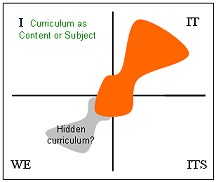 Curriculum as Content or Subjects:
Curriculum as Content or Subjects: This metaphor portrays a traditional image of curriculum that stretches back to Pythagoras and Plato. This curriculum is one which receives contents from traditional academic disciplines and transmits them to the learner.
Intent: Curriculum development centres largely on subjects, contents, timetables and booklists. Needs may be defined in terms of preparation for university, commerce or general study.
Criticism: Does not account for cognitive development, creative expression, and personal growth. Nor for planned and un-planned activities that are a major part of students’ experiences at school.
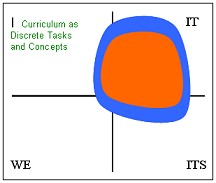 Curriculum as Discrete Tasks and Concepts:
Curriculum as Discrete Tasks and Concepts: The curriculum is seen as a set of tasks to be mastered and is derived from training programs in business, industry and the military.
Intent: ‘Apprenticeship’ with an adult to gain certain knowledge and skills.
Criticism: Does not prepare the learner for a changing world. Suited to technical training rather than conceptual understanding.
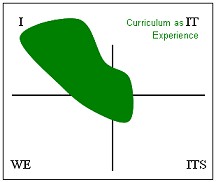 Curriculum as Experience:
Curriculum as Experience: This image of curriculum, following John Dewey, emphasizes experience rather than sets of activities. Learners select a learning experience according to its significance in their life.
Intent: With this notion of curriculum, the learners have a key role in curriculum process. Experiences are created as learners reflect on the learning process.
Criticism: Students’ involvement in planning and selecting the learning experiences is very idealistic - they may not be able to decide which is of significance and which is not. How do you implement this in a large school?
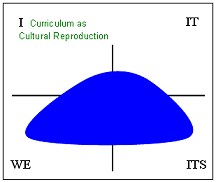 Curriculum as Cultural Reproduction:
Curriculum as Cultural Reproduction: The curriculum metaphor is concerned with the notion of transmission of cultural knowledge and values from one generation to another.
Intent: To prepare the youth for the culture of a certain community, state and country.
Criticism: Helps maintain the status quo by transmitting middle class culture rather than that of the oppressed. Does not help develop critical thinking.
 Curriculum as “Currere”:
Curriculum as “Currere”: The curriculum is the interpretation of the learner’s lived experiences – the learner comes to understand their past, how it drives the present and how it directs the future of their personal and professional life. Individuals come to a greater understanding of themselves, others, and the world about them.
Intent: Freedom from unwarranted convention, ideology and labelling. To mutually fashion new directions for oneself, others and the world.
Criticism: Self-understanding is a parental responsibility. The search for self-knowledge requires professional therapists.
 Curriculum as Intended Learning Outcomes:
Curriculum as Intended Learning Outcomes: This image sees the curriculum as a process of goal setting and drawing a pathways to those goals. The outcomes are expressed in general terms like “understanding the value of…”. Today most curriculum frameworks have incorporated this image.
Intent: The curriculum is explicit and defensible. Teachers and students can determine their learning activities according to their needs and locale.
Criticism: Draws attention away from unintended outcomes relating to school culture and the hidden curriculum.
So... how does one map curriculum as connectivism? At the moment my reading places it mainly in the ITS quadrant - grounded in an objective systemic worldview but taking into account issues of social constructivism (WE quadrant) with a span across blue/orange/green and possibly into yellow memes. A much broader span than the other metaphors...
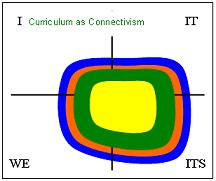 Curriculum as Connectivism:
Curriculum as Connectivism: This curriculum metaphor is related to networks and network topology. It takes a systems view of learners and sees learning as network creation.
Intent: To provide a ‘learning ecology’ that the student connects with as and when appropriate.
Criticism: Favours self-directed learners.
This is potentially a richer way of seeing curriculum provision and I'm now interested to see how this metaphor might inform our discussion of how students choose their learning, what structures we might put in place to provide learning ecologies and how we can support students to make the necessary connections... more on this later.
Our leadership team have already found Sieman's
Learning in Context powerpoint very useful (see also
this pdf paper) and I'm hoping to see him in Sydney later this year...
The above curriculum metaphors (apart from the last one) are sourced from: Schubert, W. H. (1986). Curriculum: Perspective, Paradigm, and Possibility. New York: Macmillan Publishing Company.Labels: conceptual frameworks, curriculum, integral
Holistic and Transformational Learning
The new Tasmanian Post Year 10 Curriculum Framework has just been released on CD. According to the overview document the Framework
"reflects an ‘holistic’ view of learners and learning with the experience of learning needing to extend beyond the informational to the transformational."

Our school curriculum team is now 6 months into planning for implementation. I thought I'd see if some of the current projects do indeed reflect an 'holistic' view and extend to the 'transformational'.
Project 1: New ICT Tools
This project is introducing a number of social software and presentation tools to students and teachers including blogs, podcasting, personal learning environments and digital story telling.
Do these tools enable holistic approaches to learners and learning? I think they could do... at least in the sense of students being able to express themselves through different media and teachers being able to have a fuller more inclusive view of the whole student.
Jack Miller defines holistic curriculum in terms of inclusiveness, connection and balance. Social software certainly provides connections from local to global levels and I think it can also give a better balance between Miller's tensions of individual/group, content/process and assessment/learning.
Do these tools enable transformation? Some describe these tools as "disruptive technologies" - I prefer the term 'transformational technologies' but I strongly agree. I think these tools can transform the relationship between learner and teacher, can transform how students access and undertake their own learning, and can transform a student's understanding of their place in the world.
Is it working? Still too early to tell... about 15% of teachers are now using at least one tool in their classes and feedback has been very positive but we have a long way to go. 10 copies of
Will Richardson's book (pictured) have been placed across the campus for teachers.
Project 2: Academic Achievement and Personal Enrichment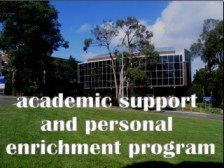
This project is providing support to a group of 60 students who are on traditional highly academic pathways. It aims to provide a learning space where students can learn together while at the same time challenging their assumptions and extending their involvement in 'non-academic' activities.
Holistic approach? Yes - this is an explicitly stated aim - to get these students to experience and express a more holistic sense of self including the physical, mental, social and spiritual.
Transformational? One part of the project that is well attended are sessions looking at enigma and anomalies (such as the evidence for advanced pre-historical civilizations) which attempts to question fundamental assumptions and worldviews based on
transformative learning theory.
Is it working? Early feedback from students would indicate that it is achieving these intended outcomes. One student wrote
"The Tuesday afternoons sessions have helped me to learn a lot about myself and others. I love learning about how people think, interact and learn. Knowing these things has changed the way I perceive myself, my education and others. I always leave the sessions deep in thought with the inspiration for further investigation."
Project 3: Lo-Tech Metal Fabrication
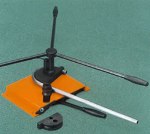
This project is providing safe and easy access to
metal work equipment for students across the college. The aim is to enable visual and performing arts students to integrate metal work into their projects without the need for training in welding and drilling.
Holistic approach? Not really... this is more about integrating skills from different subject areas.
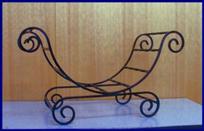 Transformational?
Transformational? One aim is to encourage more females to consider metal work so in this sense there may be an element of transformation of the perception of metal as a male only domain.
Is it working? This project is still being set up with the equipment that has just been purchased.
Project 4: Human Powered Vehicle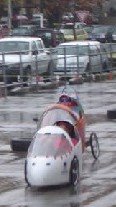
This project aims to design, build and race a three wheeled human-powered vehicle. Students from Material, Design and Technology will work with students from Physical Education to measure the vehicles performance and race it in
local and inter-state competitions.
Holistic approach? Yes in the sense that students will consider all aspects of this project and it will involve their physical, mental, emotional and social skills.
Transformational? This project aims to transform student attitudes to learning, empowerment and collaborative designing, making and appraising.
Is it working? Too early to tell - just in design stage...
Project 5: Integral Worldviews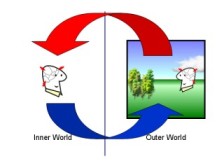
This project introduces students to aspects of
Integral Theory in an attempt to help them develop coherent conceptual frameworks that help them understand how values, assumptions and worldviews colour our perceptions.
Holistic Approach? Integral Theory by its very nature takes an holistic approach to human nature and knowledge.
Transformational? Students have reported that an integral approach does help them see things in new ways. Two students reported
"Openly challenged my way of thinking and what I personally believed in and accepted. Over-all very interesting and informative."
"Really insightful. Made me think life was more interesting… more to it."
Is it working? This project has been running for over a year and student feedback has been very positive.
Labels: holistic, ICT tools, integral, transformation
Knowledge Metaphors
How we see 'education', 'schooling', 'learning', 'teaching' and 'assessment' has much to do with how we see knowledge. Here is a page that my wife
Sue put together that nicely illustrates some different ways of seeing knowledge...

Knowledge gained from different disciplines is quite separate and can’t be easily integrated.
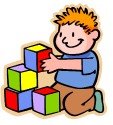
You can build knowledge from different disciplines, but some disciplines are more foundational than others. To what extent is knowledge restricted by its foundations?
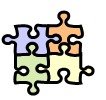
Knowledge from different disciplines fit together like a jigsaw puzzle.
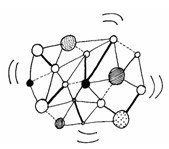
Integrating knowledge from different disciplines creates emergent understandings, new perceptions and new questions. Do our questions create the universe to be discovered?

Knowledge in one area is a reflection of the whole. Can you know the whole through complete knowledge of the part?
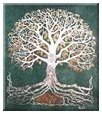
Knowledge is like a tree… mathematics explains physics explains chemistry explains biology explains love. Is there knowledge to be found outside the branches of the tree?

Knowledge is nested: Knowledge at each level includes and transcends earlier levels.
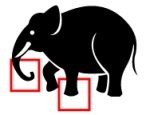
Each discipline illuminates a facet of the 'truth'. We need to bring in all perspectives to see the whole. What perspectives might be missing?

Knowledge is like a river… it moves and changes. If you dip your toe into the river tomorrow, you will experience a different river from today. There is no truth which stands still to be found.
No dout there are many other metaphors...
4 Quadrant Integral Theory might suggest all the above have some validity... eg knowledge gained from methods of inquiry in one quadrant should be applied very cautiously to other quadrants (buliding blocks)
and knowledge that omits any quadrant gives only a partial view of 'reality' (elephant)
and each quadrant contains parts which are wholes - holons (nested)
and each quadrant is evolving with no end in sight (river)...
Graphics: MS Clipart Online
Labels: integral, learning
An Integral Part of Learning?
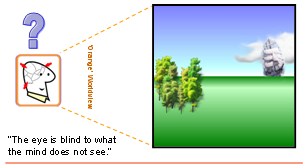 More than 60% of year 11/12 teachers would consider using Integral Theory with their classes!
More than 60% of year 11/12 teachers would consider using Integral Theory with their classes!
Yesterday Sue (my wife) and I had the privilege of presenting aspects of Integral Theory to 50+ year 11/12 teachers in a non-government school. In spite of being a warm late afternoon and the fact that we covered 8 concepts and associated 'jargon' in 2 hours we received very enthusiastic responses.
I was surprised to discover quite a few teachers had already read some of Ken Wilber's work and a couple had already used aspects of Integral Theory with their classes.
This was the first time we've presented Integral Theory to a larger group of teachers - I presented the same concepts to several classes (yr 11/12) last year. From the mixed teacher feedback for some sections the balance of breadth to depth needs some adjustment - although I still think that a reasonable breadth is necessary to appreciate the coherence of the integral framework. There was less time for teacher discussion than with students who had a 3hr session.
More than half of those present said that they thought the concepts would be useful/very useful in their teaching. Many requested follow-up discussion so that they can develop the ideas for their classes. Some of this will be done through on-line presentations and forums over the next few weeks (although I've discovered the forum link has broken over the summer holidays).
In the last 10 minutes we touched briefly on 'stages of development' and 'information/transformation'. In retrospect this may have been a mistake in such a short time - although one teacher indicated that this was the most important part of the presentation for them.
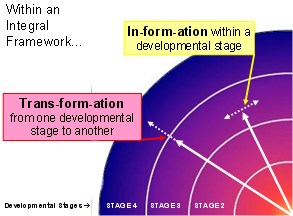
Next week I'll begin working with some of the classes of teachers in government yr 11/12 colleges that were involved in last year's trials. We are going to introduce students to Integral Theory from the start of the year (classes start tomorrow in Tasmania) and develop the concepts as they progress through their courses.
Labels: conceptual frameworks, integral, metacognition, teaching
Integral Futures
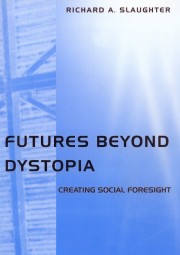 All education is futures education
All education is futures education according to Australian futurist
Richard Slaughter. He says most schools are about preparing students for active citizenship in the future. And
"young people do not need to be persuaded to consider the future. They already have powerful interests in the self-constitution of their own lives."
However he also says:
"The challenge is to re-invent schools on a new philosophical and operational basis, not see them over-whelmed by economic rationalism, still less by the over-hyped 'communications revolution'. "
I'm reading Futures Beyond Dystopia: Creating Social Foresight by Slaughter and think it has much to inform current curriculum initiatives - particularly now in Tasmania with Personal Futures and World Futures 'essential learnings' for K-10 and Futures a key purpose in the new Post-Year 10 Framework.
To avoid shallow and often overly Westernised and empirical futures perspectives Slaughter calls for an integral approach to futures at all levels of education including students, teachers, curriculum leaders and administrators. "The need is for a broader and deeper view of futures enquiry."
'Integral futures' is about including subjective inner realities along with objective outer realities - something often called for by holistic educators. Slaughter shows how Wilber's 4 Quadrant AQAL Integral Model provides a powerful conceptual framework that gives breadth, depth and balance to futures literacy, futures methodologies and futures tools.
In this way the critical importance of looking at cultural values, assumptions and worldviews (lower left quadrant) and the inner world of individual identity, meaning and purpose (upper left quadrant) as key aspects of any transformational process is not forgotten.
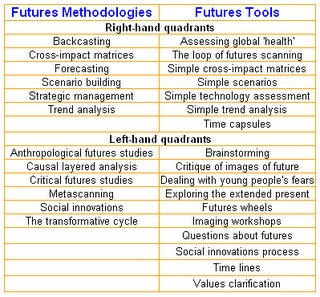 Slaughter maps pop futurism, problem-oriented futures work, critical futures studies, epistemological futures, and environmental scanning across Wilber's quadrants showing the strengths and gaps in each approach over the last century.
Slaughter maps pop futurism, problem-oriented futures work, critical futures studies, epistemological futures, and environmental scanning across Wilber's quadrants showing the strengths and gaps in each approach over the last century.
Of course with all this talk of futures we need to remind ourselves that futures education is about empowering students in the present - or better still perhaps in the 'NOW' which includes and expanded sense of past-present-future.
I recently saw this Alan Watts Flash presentation on an Integral Education Forum which graphically shows the dangers of always looking to (waiting for) the 'future'... well worth a look if you haven't seen it.
With the current global focus on transforming learning and teaching an 'integral futures' perspective seems timely as we look at possible, probable and preferred educational futures - lest we forget the critical place of both individual and collective inner realities... for both students and teachers.
Labels: 21stCentury, conceptual frameworks, integral, metacognition, worldviews
Student Feedback on Integral Theory
 Student response
Student response to
Integral Theory over the last few months has been very enthusiastic. Although you can't read the left hand column in the linked doc you can see from the feedback summary that I touched on many concepts over 2.5 hrs. Some a little too briefly perhaps but I think it is important for students to get a clear sense of the coherency of the overall framework.
So far I have only introduced it to Level 5 English classes but I know of teachers internationally who have received very positive feedback from grade 9 and 10 students... so I'm keen to try it with other classes next year.

I'm about to run similar sessions for teachers so it will be interesting to compare feedback... For teachers I am hoping Integral Theory will provide a coherent conceptual framework that helps to make sense of some fundamental concepts underpinning the
ELs and PY10 Frameworks such as: * Worldviews * Value systems * Systems Thinking * Disciplines * Transdisciplinary * Transformation *
Labels: conceptual frameworks, integral
Values and Memes

I have been thinking about Values and PY10 and the observation from some teachers that there might be a dominance of
"middle-class values" of those consulted during the review and our subsequent documentation and thinking.
Some have asked interesting questions about recognising the the values of the full range of our students (eg generational poverty) and the complex relationship between student, teacher and community values - particularly in the context of globalisation and our location in the Asia-Pacific.
I have written something introductory about values, memes and Integral Theory in order to promote some discussion among those interested in this area...
Labels: integral, values
Making Sense of Student Development
I've sent out the next email installment on Integral Theory - this time looking at how various lines of development can be mapped across generic stages of growth. I'm not sure who will have time to read it given that reports are due this week!

PY10 leaders have begun to think about our college handbook for 2006. We need to look at our pre-requisites in terms of the ELs Standards and Progressions - this is no easy task because only a few of us have had time to look at them. Lots of work to be done here.
While on the subject of ELs I've been looking at the new Victorian ELs (VELs) to be implemented by all Victorian teachers in 2006! Also found links to the Northern Territory 'EsseNTials' and the South Australian ELs .
Labels: growth, integral, worldviews
To theorise or not to theorise...
After spending the last few months learning and talking about Integral Theory I finally have got to the point where I have begun to write about it a little more deeply. But this is no easy task!
Ken Wilber, who has done much to develop Integral Theory has been called the 'Einstein of Psychology' because aspects of the theory are as radically new as Einstein's theories in science were nearly 100 years ago. However I'm hoping that applying what Wilber and others have come up with is a little more straight forward.
I'm keen to promote discussion of Integral Theory because reports from teachers who are using it to design curriculu and courses are very positive. Many have also used it in their classes and some have great responses from students who found it has some useful tools for research, problem-solving, interdisciplinary inquiry and understanding self and others.
The paper I am writing sketches out some of the areas of Integral Theory that I would like to discuss for our college curriculum - but that took up 20 pages! Not quite the short introduction I was planning.
I have sent what I have written to a number of people locally and internationally and initial responses have been very positive. However while most believe that the information is important (and some believe even critical) to understanding education for years 11 and 12, views vary widely on whether teachers will have the time or inclination to look at such a theoretical perspective of curriculum.
Some believe all college teachers should read the paper and that most would find it very useful both in thinking about curriculum and in their own teaching practice. Others believe only a few teachers would want to look at it.
Wilber's integral perspective maps human experience across 4 quadrants.
The 4-Quadrant Integral Model provides a comprehensive map of human experience and capacities which is being applied to many fields of human endeavour including global ecology, business and organizational practice, medicine and international politics. If we put this in the context of student learning we obtain an integral map that might represent different domains of a curriculum:

Integral approaches to curriculum could provide:
- Frameworks for learning, research and problem solving processes
- Lenses to ensure structures and processes are more balanced and inclusive
- Tools for transformational change
- A common language for transdisciplinary inquiry
So... where to from here? Perhaps there are several possibilities.
- Some who have read the paper are already keen to form a group to discuss it in some depth.
- The paper could be made available for anyone who wants to read it.
- I have begun to break it down into small chunks - the first of which I have just sent as an email to all teachers at Hobart College and a few interested teachers in other colleges.
- Offer small lunch-time forums after Easter - perhaps after the next chunk goes out in another email.
In the meantime I will work on a second draft based on all the feedback I have received so far - thanks to all those who have sent me comments.
Labels: conceptual frameworks, curriculum, integral
GUTs and TOEs

Over the last few months I have been involved with an international online group on Integral Theory. Integral Theory has developed significantly over the last 25yrs with many international groups searching for Grand Unifying Theories (GUTs) and Theories Of Everything (TOEs). We have been discussing Ken Wilber's 4 Quandrant model where all human experience is divided into inner and outer experience and individual and group experience giving 4 quadrants.
Anyway during one of our telephone conference calls we were challenged to come up with “integral biographies” of ourselves to share on an online forum as a way for others to get to know us better. I was quite pleased with my handiwork so I thought I'd share it. More on Integral Theory later...
First an integral pictorial bio without fussing about placement in quadrants...

And then mapped as a 4 quadrant integral bio...

An interesting exercise...
Labels: integral






 I was then able to generalise the 'integral mapping' of any issue like this:
I was then able to generalise the 'integral mapping' of any issue like this:



























 Slaughter maps pop futurism, problem-oriented futures work, critical futures studies, epistemological futures, and environmental scanning across Wilber's quadrants showing the strengths and gaps in each approach over the last century.
Slaughter maps pop futurism, problem-oriented futures work, critical futures studies, epistemological futures, and environmental scanning across Wilber's quadrants showing the strengths and gaps in each approach over the last century. 










